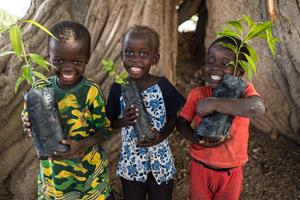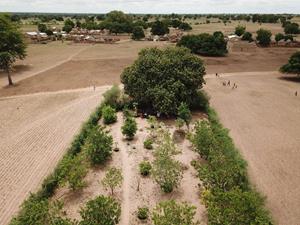Why You Shouldn't Plant a Tree this Earth Day
Tree planters call on public to do more this Earth Day. Noting mounting threats to the planet and civilization, international development nonprofit Trees for the Future makes a case for responsible consumption and thoughtful support and protection of the environment.
Silver Spring, Maryland, April 16, 2019 (GLOBE NEWSWIRE) --
Earth Day - a day dedicated to planet Earth and its protection. Bringing attention to nature and some of the most pressing threats facing the environment, Earth Day has accomplished quite a lot in the nearly 50 years since its beginning. Since 1970, advocates for the planet have stood up to harmful industry practices, lax policies, and wasteful use of finite resources. It is no surprise that trees, and more specifically tree planting, have become a rallying point for Earth Day enthusiasts and supporters over the years.
Trees. For those wishing to uphold the health and vitality of the planet, trees are a promising remedy to a number of harms done to Mother Earth every year; they absorb the rising CO2 levels in the atmosphere, their root systems keep pollutants from reaching the water supply, and they rebuild acre upon acre of destroyed forests. Year after year, this idea of remedial tree planting inspires countless citizens of the world to get up and get planting.
And people are making a difference! Some scientific estimates have declared that there are more trees on the planet today than there were three decades ago.
Take a moment to fully appreciate the fact that despite the repeated environmental harms committed by industries, governments, organizations, businesses, and individuals; other industries, governments, organizations, businesses, and individuals have made real progress in repairing those harms.
Now, take another moment and consider how much further along humanity would be in restoring the planet if trees became a larger priority. What if trees were not thought of as a reactive remedy to climate change, but as a proactive solution capable of protecting the planet and everyone on it for years to come? What if instead of removing them when it is convenient and planting others as restitution, we took a step back and started appreciating trees for their invaluable abilities from the beginning?
Trees don’t just suck up carbon, they are the building blocks of entire ecosystems, drivers of plant and animal success, and key components of a dependable water cycle. Nowhere is this more evident than in Forest Gardens. Forest Gardens are a collection of trees, shrubs, vines, vegetables, fruits, and herbs that grow harmoniously together. Forest Gardens use agroforestry and permaculture to get the most out of the land, while still giving just as much back to the land. International development organization Trees for the Future uses the Forest Garden Approach to completely transform parched, degraded land into unrecognizable, flourishing havens of biodiversity. In contrast to the more typical and overwhelmingly accepted monocrop agriculture, permaculture and Forest Gardening have positive impacts on the environment and the communities in which they are employed.
In the push to feed a growing global population, leaders and the public have accepted genetically modified crops and large scale monocropping as a solution to feeding 8 billion people. But did you know agriculture is one of the leading causes of greenhouse gas emissions? Big Agriculture is the leading cause of deforestation, destroying forests and fertile lands to make way for monocrop systems, planting genetically modified crops in rows, expending unsustainable amounts of water, and then feeding that grain to livestock. Not only is this overwhelmingly accepted form of agriculture having a devastating effect on the planet’s environment, climate, ecology, and biodiversity… it is unable to meet the needs of a growing population because of low yields and its focus on calorie-rich, nutrition-scarce crops like corn.
But all is not lost - trees are the future. Agroforestry, permaculture, and regenerative agriculture practices like those used in the Forest Garden Approach are accomplishing what traditional agriculture can’t and fixing the problems that Big Agriculture has created.
Trees for the Future farmers are ending harmful and ineffectual monocrop practices and achieving health and prosperity for themselves and their families through their Forest Gardens. Year round, farmers are able to produce more than a dozen varieties of vegetables and harvest fruit and nuts from their trees. They have a diverse and nutritious bounty for their own tables and to take to market to earn a steady income. All of this, while their trees remove literal tons of carbon dioxide from the air every year.
So, this Earth Day, consider going beyond planting a tree. Instead of planting one tree one day a year, support industries that value trees and what they offer to their ecosystem and the world. Support businesses and producers that work with the land instead of using it up and moving on. Plant trees with organizations that are looking at the bigger picture, considering people, profit, and planet.
Donate to Trees for the Future and become part of the sustainable solution. Do more than plant trees - change lives and the planet.
Attachments
Lindsay Cobb Trees for the Future 3042667626 lindsay@treesforthefuture.org
Legal Disclaimer:
EIN Presswire provides this news content "as is" without warranty of any kind. We do not accept any responsibility or liability for the accuracy, content, images, videos, licenses, completeness, legality, or reliability of the information contained in this article. If you have any complaints or copyright issues related to this article, kindly contact the author above.




